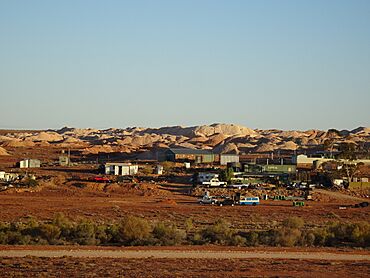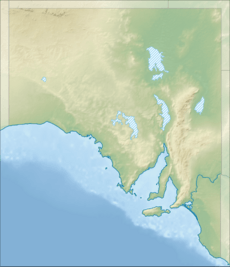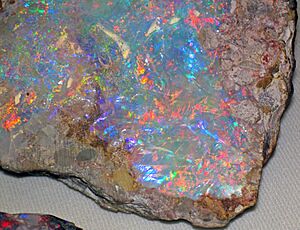Andamooka, South Australia facts for kids
Quick facts for kids AndamookaSouth Australia |
|||||||||||||||
|---|---|---|---|---|---|---|---|---|---|---|---|---|---|---|---|

Andamooka in 2021
|
|||||||||||||||
| Population | 262 (2021 census) | ||||||||||||||
| Established | 1930s (mining settlement) 16 December 1976 (Government Town) 8 February 2001 (locality) |
||||||||||||||
| Postcode(s) | 5722 | ||||||||||||||
| Elevation | 76 m (249 ft) | ||||||||||||||
| Location | 600 km (373 mi) N of Adelaide | ||||||||||||||
| LGA(s) | Pastoral Unincorporated Area | ||||||||||||||
| Region | Far North | ||||||||||||||
| State electorate(s) | Giles | ||||||||||||||
| Federal Division(s) | Grey | ||||||||||||||
|
|||||||||||||||
|
|||||||||||||||
| Footnotes | Adjoining localities | ||||||||||||||
Andamooka is a small town located about 600 kilometers north of Adelaide in South Australia. It sits on the traditional lands of the Kokatha people. Andamooka is special because it's the biggest town managed by the Outback Communities Authority, not a regular local council. This means it has a different way of being governed.
Contents
History of Andamooka
Early Days and Pastoral Land
Andamooka is on the traditional lands of the Kokatha people. The name "Andamooka" comes from a salt lake, which was known by its Aboriginal name "Andemorka" as early as 1866. This was long before anyone found opal there. The exact meaning of the name is not fully clear.
In 1857, a group of explorers led by Charles Swinden found the area. They called it 'Swinden's Country'. They said it was mostly dry land but had some good spots for grazing animals. These small areas of good land attracted farmers, which led to the creation of Andamooka Station. For about 50 years, farming was the only main activity here.
Since 2014, the Kokatha people, who are the traditional owners, have been running Andamooka Station. They do this through their company, Kokotha Pastoral Company. They also manage nearby Purple Downs and Roxby Downs Stations.
Opal Discovery and Town Growth
The precious gem Opal was first found in Andamooka in 1930. After this discovery, the town began to grow as miners set up camps. At first, there wasn't even a proper post office. The "Andamooka Opal Fields" Post Office opened in 1947 and was later renamed "Andamooka" in 1990.
The main road leading into Andamooka was paved in the 1990s. However, many roads within the town itself are still unpaved dirt tracks.
Historic Buildings in Andamooka
Several old buildings in Andamooka are considered important historical sites. They are listed on the South Australian Heritage Register. These include the Andamooka Historic Precinct, which has several old miners' homes and dugouts. Dick Clark's Residence is also a listed heritage building.
Opal Mining in Andamooka
The Andamooka area has many places where opal can be found, called opal fields. One well-known field is White Dam. In the early days, miners used simple tools like picks and shovels to dig for opal. Many of these early miners were unique characters who gave the town a "Wild West" feel.
From the 1960s and 70s, new methods arrived. Miners started using bulldozers to dig deep cuts into the ground. This made it easier to reach the layers where opal was hidden. Once they reached these layers, they could dig sideways tunnels to find more opal.
The opal layers in Andamooka are not as deep as in other famous opal fields like Coober Pedy or Lightning Ridge. This means the opal is easier to get to. However, the opal found here is generally rarer and not always of the highest quality. This made it a good place for smaller miners who didn't have a lot of money to invest. Even so, some amazing opals have been found here, including the famous Andamooka Opal.
Housing and Community Life
In the beginning, many miners lived in simple dugouts. These were homes dug into the side of hills. Living underground helped keep the homes cool in summer and warm in winter. Because the town wasn't officially surveyed, people just claimed land with a "Miners' Right." This made it hard for people to invest in building proper homes.
By the 1970s, Andamooka was becoming a "shanty town" with many temporary homes. A group of citizens tried to organize things like electricity and keeping the dirt airstrip ready for the Flying Doctor. Roads were just dirt tracks, and the main street was a dry creek bed.
There were not many government services. Police only visited once a week from Woomera until a police station opened in 1966. The "Tucker Box" restaurant was a popular place for people to meet. The Andamooka Co-Op Ltd sold groceries and fuel.
In the 1980s, things changed. The nearby Olympic Dam mine started to grow, bringing more jobs. Many houses were moved to Andamooka from Woomera, which was being scaled down. While some old dugouts still stand, most people now live in more modern homes.
Population and Economy
In the 2021 census, Andamooka had 262 residents. There were slightly more males than females. The average age of people in Andamooka was 57 years old, which is older than the national average. About 10.8% of the population were children under 15, and 31.3% were 65 or older.
About 4.6% of the people in Andamooka were Aboriginal and Torres Strait Islander. Most residents (75.2%) were born in Australia. Other common birthplaces included England, Austria, Germany, Croatia, and Italy. The most common belief was "No Religion."
Mining is the main industry in Andamooka. Since the Olympic Dam copper-uranium mine and the town of Roxby Downs were built in the 1980s, some Andamooka residents now work at the mine or in Roxby Downs. Many others are retired.
For a long time, Andamooka relied on water brought in by trucks from Roxby Downs. They also collected rainwater in tanks. Now, a pipeline has been built to the town. However, water still needs to be trucked to the town's main water tanks.
Andamooka in Pop Culture
The 1979 film The Last of the Knucklemen was filmed in and around Andamooka. The famous "Andamooka Opal" was given to Queen Elizabeth II in 1954 during her first visit to Australia. This beautiful opal weighed about 203 carats after it was cut.
Andamooka was also mentioned in the book World War Z by Max Brooks.
Famous Opals from Andamooka
- The Andamooka Opal, also known as the Queen's Opal, was given to Queen Elizabeth II in 1954.
- The Addyman Plesiosaur is an amazing opalized skeleton. It is considered the best opalized skeleton ever found on Earth.
Climate in Andamooka
Andamooka has a very dry, arid climate. The average annual rainfall is extremely low, only about 160 millimeters per year. Summers are very hot, with daytime temperatures often going above 40 °C (104 °F). Winters can be quite cold at night, with temperatures often dropping close to 0 °C (32 °F).
| Climate data for Andamooka | |||||||||||||
|---|---|---|---|---|---|---|---|---|---|---|---|---|---|
| Month | Jan | Feb | Mar | Apr | May | Jun | Jul | Aug | Sep | Oct | Nov | Dec | Year |
| Record high °C (°F) | 47.8 (118.0) |
47.3 (117.1) |
43.9 (111.0) |
40.0 (104.0) |
31.8 (89.2) |
30.2 (86.4) |
29.6 (85.3) |
33.6 (92.5) |
38.4 (101.1) |
43.4 (110.1) |
48.0 (118.4) |
48.3 (118.9) |
48.3 (118.9) |
| Mean daily maximum °C (°F) | 36.5 (97.7) |
35.6 (96.1) |
32.2 (90.0) |
27.4 (81.3) |
22.4 (72.3) |
18.6 (65.5) |
18.4 (65.1) |
20.6 (69.1) |
24.6 (76.3) |
28.1 (82.6) |
31.8 (89.2) |
34.5 (94.1) |
27.6 (81.7) |
| Mean daily minimum °C (°F) | 21.3 (70.3) |
21.2 (70.2) |
18.2 (64.8) |
14.0 (57.2) |
10.0 (50.0) |
6.9 (44.4) |
6.0 (42.8) |
7.2 (45.0) |
10.4 (50.7) |
13.5 (56.3) |
17.1 (62.8) |
19.4 (66.9) |
13.8 (56.8) |
| Record low °C (°F) | 11.5 (52.7) |
10.0 (50.0) |
8.0 (46.4) |
4.9 (40.8) |
1.1 (34.0) |
−1.0 (30.2) |
−1.6 (29.1) |
−0.4 (31.3) |
1.7 (35.1) |
5.2 (41.4) |
8.0 (46.4) |
10.2 (50.4) |
−1.6 (29.1) |
| Average precipitation mm (inches) | 17.3 (0.68) |
25.2 (0.99) |
13.8 (0.54) |
14.8 (0.58) |
15.5 (0.61) |
16.0 (0.63) |
12.6 (0.50) |
12.8 (0.50) |
12.6 (0.50) |
18.9 (0.74) |
14.3 (0.56) |
18.6 (0.73) |
192.4 (7.57) |
| Average precipitation days | 3.3 | 2.6 | 2.3 | 2.3 | 3.6 | 4.3 | 4.3 | 4.2 | 3.9 | 3.8 | 3.9 | 3.2 | 41.7 |



